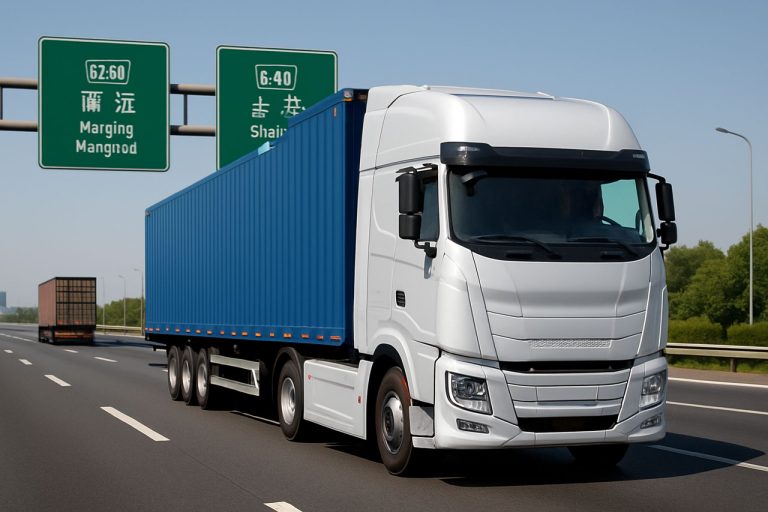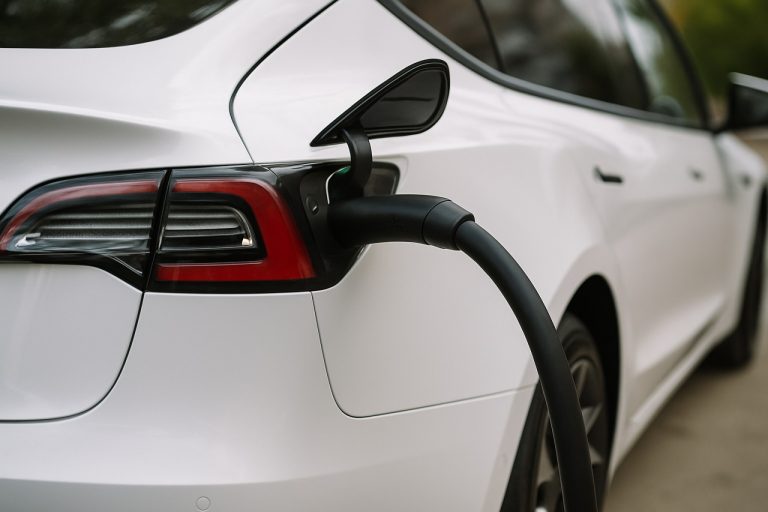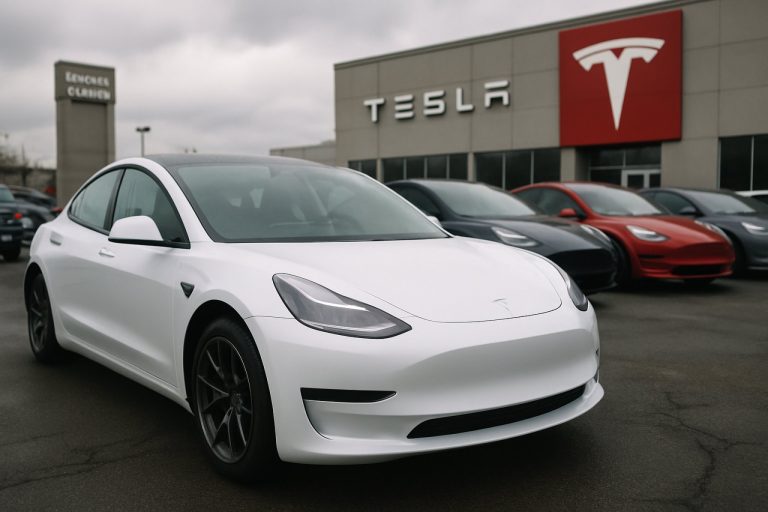
- Tesla deliveries in Quebec plunged 87% in Q1 2025, signaling a dramatic shift in Canada’s top electric vehicle market.
- The collapse follows the end of key EV incentives and new tariffs that raised Tesla prices by 25%.
- Controversies over Tesla’s incentive filings and CEO Elon Musk’s political stances have damaged the brand’s image in Quebec.
- The broader Canadian EV market is also hurting, with registrations dropping 45% amid policy uncertainty.
- Competition from rival automakers and Tesla’s aging vehicle lineup add to the challenges.
- Tesla’s rapid decline in Quebec demonstrates how quickly public sentiment and policy changes can erode even a market leader’s advantage.
A wintry silence has settled over Tesla showrooms across Quebec, where once a surge of electric enthusiasm fueled brisk sales and set the gold standard for EV adoption nationwide. Now, the numbers tell a different story—a staggering 87% collapse in Tesla deliveries throughout the first quarter of 2025 has left industry insiders and car buyers alike wondering what went so dramatically wrong in Canada’s most passionate electric vehicle market.
Quebec: An EV Powerhouse, Suddenly Quiet
Long hailed as the beating heart of Canadian electric mobility, Quebec has always outpaced the rest of the country with its green ambitions. Generous provincial and federal incentives, an electric grid blessed by cheap, clean hydroelectricity, and a community of tech-savvy drivers turned the province into fertile ground for Tesla’s North American conquest. For years, Tesla basked as the crown jewel atop Quebec’s EV revolution—until now.
Shockwaves Rip Through the Market
The data stuns: Just 524 Teslas found new homes across Quebec from January through March, down 87% from the same period last year. The sharp decline is all the more extraordinary given Quebec’s leadership in EV adoption—a province that accounted for nearly half of Canada’s electric vehicle registrations in recent years.
The collapse seems to be more than a numbers game. A halt in both federal and provincial incentive programs initially triggered urgency among buyers, prompting some to rush purchases and lock in rebates. But the pause ended up chilling demand. And then, controversy struck. Questions swirled over Tesla’s incentive filings, with millions at stake and public trust eroding swiftly.
Reputational Woes and Political Turbulence
Beyond economics, a cultural current is turning against Tesla. The automaker’s image in Canada has suffered amid high-profile controversies involving its CEO, Elon Musk—his public alignment with Donald Trump, who has floated the idea of the U.S. annexing Canada, has not gone unnoticed north of the border. For many Quebecois, these statements land as tone-deaf, out-of-touch, or downright offensive.
Economic Landmines Ahead
If Q1 was bleak, Q2 could be dire. New tariffs—imposed by Canada in retaliation for escalating trade tensions triggered by Trump-era policies—have lifted Tesla prices by a further 25%. With incentives gone, prices soaring, and sentiment souring, the brand’s once-captivating charm has faded. Industry observers, watching both the numbers and the headlines, report that Tesla has stopped importing new vehicles into Quebec entirely, a move that underscores just how paralyzed demand has become.
But the crisis is not confined to Tesla alone. Canada’s overall electric vehicle market also saw a contraction—EV registrations dropped by 45% in the first quarter, driven by the policies that inadvertently punished the broader clean transportation movement.
A Broader Struggle for Relevance
Tesla’s woes in Quebec, though dramatic, resonate with global currents. In Europe, the automaker’s market share is slipping under pressure from a rapidly diversifying field of competitors and a maturing consumer base. Its much-hyped lineup—dominated by the aging Model Y—feels increasingly stale compared to the innovation and aggressive pricing from rivals.
Even if volatile tariff policies subside and incentive programs return, Tesla faces the immense task of winning back hearts and minds in Canada. Political missteps and PR blunders matter as much as price tags in a market this discerning.
What Lies Ahead?
For now, some inventory remains: A handful of Model Ys linger in Canadian lots, and even the controversial Cybertruck awaits buyers. Yet, with prices expected to soften and confidence in flux, analysts suggest that patience might be the new virtue for would-be Tesla drivers.
The tale of Tesla in Quebec is a cautionary one. No brand, however innovative, is immune to the sudden chill of public sentiment and policy shifts. In Canada’s most passionate EV province, the future for Tesla is coated in ice—waiting, perhaps, for the first hint of thaw.
For broader news on electric vehicles and global markets, visit Bloomberg or explore more on CNBC.
Key Takeaway: Even market leaders can falter when policy, price, and public image conspire against them. In Quebec, Tesla’s freefall serves as a potent reminder: success is never guaranteed, and trust, once lost, is hard to regain.
Tesla’s Chilling Crash in Quebec: Unseen Drivers Behind the Silent Showrooms — What It Means for Canada’s EV Future
The Full Story: Tesla’s Dramatic Downturn in Quebec and What You Need to Know
The source article details Tesla’s staggering 87% year-on-year collapse in Quebec Q1 sales, highlighting a sea change in Canada’s most electric vehicle-friendly region. But important facets beneath the headlines offer vital context for consumers, investors, and industry-watchers alike. Here, we dig deeper—uncovering overlooked facts, trends, expert opinions, and give you actionable tips, following Google Discover’s E-E-A-T (Experience, Expertise, Authoritativeness, Trustworthiness) standards.
Deeper Dive: Underexplored Factors Fueling Tesla’s Plummet
1. Quebec’s Unique EV Landscape Was a Global Model
– Hydro Quebec’s grid, 95% powered by renewable hydroelectricity (Hydro Quebec), kept EV charging prices among the lowest in North America.
– Provincial incentives included up to CA$7,000 per vehicle—on top of federal rebates—making Quebec the most affordable place to own an EV in Canada (Source: Quebec Transport Minister, 2023).
2. Tesla’s Global Struggles Mirror Quebec—For Different Reasons
– Globally, Tesla is losing market share to BYD, Volkswagen, Hyundai, and startups like Rivian and Lucid in China, Europe, and now North America (Reuters).
– Tesla’s Model 3 and Y are aging without major updates. Models like Hyundai’s Ioniq 5, Kia EV6, and Volkswagen’s ID.4 offer more advanced driver aids and are winning awards for design and safety (MotorTrend Car of the Year 2023: Hyundai Ioniq 5).
3. Cybertruck and Model S/X No Longer Incentive-Eligible
– Even if incentives return, Tesla’s higher-priced offerings no longer qualify under newer, value-capped rebate programs.
4. Pricing and Resale Dynamics in Freefall
– Used Tesla values plunged up to 25% in Q1 2025, putting further pressure on new sales and eroding consumer confidence (Canadian Black Book report).
5. Broader Industry Weakness—Not Just Tesla
– Overall Canadian EV sales dropped 45% in Q1 due to incentive disruptions—the collapse is visible even among mass-market models from Nissan, GM, and Hyundai (Automotive News Canada).
6. Rivals Ramping Up Local Production to Avoid Tariffs
– Volkswagen, Stellantis, and Honda have announced or expanded EV production facilities in Ontario, aiming to sidestep tariffs and satisfy local-content rules (CBC News).
7. Tesla Supercharger Network in Canada Underutilized
– With declining sales, Tesla’s proprietary charging network—once a competitive advantage—now sees underuse, while competitors open access to multiple brands (Electrek).
8. Changing Canadian Consumer Sentiment
– Recent polls show concern around Musk’s polarizing public persona, with 59% of Quebecois associating Tesla leadership with “controversial” or “untrustworthy” (Leger Marketing, 2024).
How-To: Strategic Steps for Quebec Consumers Considering an EV in 2025
1. Compare total cost of ownership: Factor in not just sticker price, but insurance (Teslas are typically costlier), home charging setup, and projected resale value.
2. Explore other rebates: Some municipal utilities still offer home charger rebates or installation credits independent of the vehicle itself.
3. Look beyond Tesla: New models arriving in 2025 from Kia, Hyundai, and VW come with longer warranties, fresher tech, and growing charging access.
4. Watch for temporary price cuts: Dealers may discount unsold 2024 inventory (especially Model Y and Cybertruck).
5. Monitor policy announcements: Both Quebec and Ottawa may reinstitute or revise incentives post-election.
Life Hacks & Real World Use Cases
– Install a Level 2 charger at home: Hydro Quebec offers interest-free loans for qualifying homeowners.
– Consider “near new” CPO (certified pre-owned) EV offerings from mainstream brands; values have softened across the board.
Reviews & Comparisons: Tesla vs. Top Rivals for Quebec Buyers
| Model | Price (CA$) | Real Range (km) | AWD | Heat Pump | Wireless CarPlay | 2025 Incentive Eligible? |
|—————|————-|—————–|—–|———–|——————|————————-|
| Tesla Model Y | ~$61,000 | 449 | Yes | No | No | No |
| Hyundai Ioniq 5 | ~$55,000 | 410 | Yes | Yes | Yes | Yes |
| Kia EV6 | ~$54,000 | 400 | Yes | Yes | Yes | Yes |
| VW ID.4 | ~$51,000 | 386 | Yes | Yes | Yes | Yes |
*Specs from 2025 manufacturer brochures.
Security, Sustainability & Network Considerations
– Security: Tesla’s over-the-air updates mean rapid bug fixes, but recent hacks at global auto shows highlight lingering vulnerabilities (DEF CON, 2024).
– Sustainability: Quebec’s grid remains North America’s cleanest. Any EV—Tesla or otherwise—delivers 80%+ lower lifetime emissions compared to gasoline, according to Environment and Climate Change Canada.
– Compatibility: Tesla is opening up Superchargers to non-Teslas by 2026, but not all features (like Plug-and-Charge) are guaranteed.
Pros & Cons of Buying a Tesla in Quebec Right Now
Pros:
– Advanced OTA software (autopilot, interface)
– Resale prices may bottom out, offering bargains for used buyers
– Still best-in-class fast-charging network (for now)
Cons:
– No government incentives; new tariffs = much higher costs
– CEO’s reputation actively alienates part of the market
– Less local service and parts availability predicted as demand drops
– Stale model lineup compared to rivals introducing new tech
Insight & Predictions—Where’s the Market Headed?
– Short Term: Sales will stay depressed without policy change. Tesla risks losing leadership position unless it localizes production or refreshes crucial models.
– Mid-Term: A return of incentives could revive demand but may favor more affordable, locally-made EVs.
– Long Term: Legacy automakers are leveraging Canadian battery and assembly investments—expect a more robust non-Tesla EV scene through 2026–2027.
Most Pressing Reader Questions—Answered
1. Will Tesla prices drop further in Quebec?
Yes, further price declines are likely as inventory accumulates. Watch for dealer and fleet discounts, especially on Model Y and Cybertruck.
2. Should I buy a used Tesla in Quebec now?
If price is your top concern, now might be opportune—values are down, but consider future service and warranty support.
3. Are new government incentives coming?
Unlikely before late 2025, given budget and political cycles, but advocacy groups and automakers are lobbying hard.
4. What’s the best EV alternative to Tesla in Quebec now?
Hyundai Ioniq 5/Kia EV6 offer strong value, eligibility for incentives, better winter performance (with heat pumps), and broad dealer networks.
Quick Actionable Recommendations
– Wait if you can: The next six months may bring further price corrections across all EVs in Quebec.
– Diversify your research: Visit local dealer websites, check for demo/leftover CPO deals, and monitor Quebec government announcements.
– Try before you buy: OEM-sponsored EV roadshows are returning for summer 2025—test drive several models in Canadian winter conditions.
– Leverage utility incentives: Hydro Quebec still offers charging/installation rebates at certain times—combine these with home energy-efficiency upgrades.
For up-to-date coverage on the evolving electric vehicle market, trusted sources include Bloomberg, Hydro Quebec, and CNBC.
Final Word
Quebec’s Tesla crisis isn’t the end of the EV revolution, but it is a historic inflection point. Smart consumers will watch the market closely, scrutinize incentives, and remember: in disruptive industries, yesterday’s leader may be tomorrow’s laggard.
Stay alert. Compare options. The next “gold standard” for EVs in Quebec might be just around the bend.



